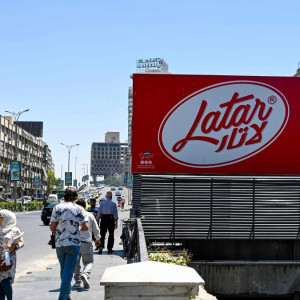Reestablishing road, rail connections ‘strategic priority’ for Syria


Syria aims to become a "regional transportation bridge," the country's transport minister said Wednesday, emphasizing that reestablishing road and rail connections with T?rkiye, Iraq, Jordan and Lebanon is a "strategic priority." Syrian Minister of Transport Yarub Badr spoke to Anadolu Agency (AA) about the Damascus Metro project, modernization efforts in the transport ministry, digital transformation, restructuring of the transportation system, investment environment and legal reforms. Concerning the comprehensive transportation sector reform process, Badr said it will not be "short-term" but "a long journey." "Citizens will begin to feel the first results in the coming weeks," he added.
Among the issues to be resolved in the short term, he cited that priority is being given to vehicle registration and ownership transfer procedures. "These processes have been at a standstill for months. To make life easier for our citizens, we will restart them as soon as possible," he stated. Moreover, Badr emphasized that the transport infrastructure suffered serious damage during the war years, adding that more than half of the railway network is unusable.
Syria witnessed massive infrastructural damage, loss of life and displacement under the long rule of Bashar Assad. "Our railway line is 2,850 kilometers (1,770 miles) long, of which about 1,500 kilometers are out of service. Rails have been damaged, some sections stolen, and locomotives and wagons are in disrepair.
The railway system is paralyzed. However, our goals are ambitious," the Syrian minister said. "In line with the vision of our president, Ahmed al-Sharaa, we aim to establish a modern, eco-friendly, digitalized and high-speed rail-based transportation infrastructure," he said.
The minister mentioned that some steps in the process can be taken quickly and that short-term solutions are expected in urban transport, freight regulations and vehicle registration processes. Stressing that a complete modernization of the railway system cannot be achieved quickly, even under ideal conditions, Badr said: "We must be realistic. A long-term and serious effort is required to move from today's level to what our citizens deserve.
Railway reform may take five years."
Reestablishing links with neighbors
Reiterating Syria's goal of becoming a "regional transportation bridge," Badr highlighted that "reestablishing road and rail connections with T?rkiye, Iraq, Jordan and Lebanon is a strategic priority." In this context, Badr described the visit of Transport and Infrastructure Minister Abdulkadir Uralo?lu to Damascus in April as "an important turning point," noting that a delegation from T?rkiye later conducted technical inspections in Aleppo and Damascus. T?rkiye has pledged to support the recovery of its war-torn neighbor, and it has already launched commercial flights to Syria following the fall of Assad last December.
The officials have also announced plans to begin supplying gas to Syria in the upcoming period.[1][2] Especially calling on Turkish bus manufacturers, Badr said: "A detailed report prepared after the meetings will lay the groundwork for railway cooperation between the two countries. Invest in Syria.
Let's carry out bus production here. We are ready to provide all necessary support." Recent announcements for the removal of the U.S. sanctions on Syria and a similar move by the European Union are, according to analysts, seen as a positive development that could boost flows to Syria following years of devastating war.[3]
Addressing the ministry's digital transformation efforts, Badr said the digitalization process would begin within three months, while the results would be seen within a year. He noted that strengthening urban transportation is among the urgent priorities and announced that 50 buses donated by a friendly country will be delivered soon.
'Ready' for investment
Badr highlighted the lack of financing as one of the biggest obstacles to reform and called on both local and foreign private sectors, saying all necessary conveniences for investment will be provided. As a positive example, he pointed to the French maritime giant CMA CGM's 30-year investment agreement at the Port of Latakia, adding: "Such investments will help restore confidence in Syria among Arab and international companies.
We are ready for investment." He also noted that Syria has not withdrawn from regional mechanisms that facilitate freight transport, such as the U.N. Economic and Social Commission for Western Asia (ESCWA) and the TIR system, explaining that "due to crises, the implementation of these agreements had been suspended, but we are working to reactivate them."
Speaking about the Damascus Metro project, Badr reminded that the project was initially proposed between 2009 and 2011 but was suspended due to the war and economic challenges. He stated that the feasibility studies of the project will be updated and restructured based on partnerships with the private sector. He also mentioned there would be three main stations in the metro.
"The metro line starting from Qaboun will connect to a major train interchange station in Hejaz Square. An integrated system with metro and rail lines will be established," he said. The minister concluded by noting that the reconstruction of the transportation sector cannot be completed in the short term.
"This is a team effort that requires patience and dedication.
However, our people will begin to see results very soon."
References
- ^ to support the recovery of its war-torn neighbor, (www.dailysabah.com)
- ^ also announced plans to begin supplying gas to Syria in the upcoming period. (www.dailysabah.com)
- ^ that could boost flows to Syria following years of devastating war. (www.dailysabah.com)